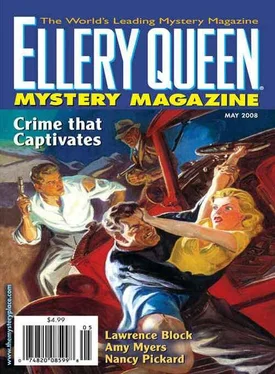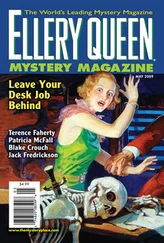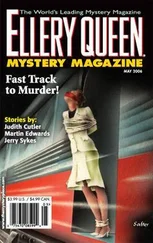Lisa Atkinson - Ellery Queen’s Mystery Magazine. Vol. 131, No. 5. Whole No. 801, May 2008
Здесь есть возможность читать онлайн «Lisa Atkinson - Ellery Queen’s Mystery Magazine. Vol. 131, No. 5. Whole No. 801, May 2008» весь текст электронной книги совершенно бесплатно (целиком полную версию без сокращений). В некоторых случаях можно слушать аудио, скачать через торрент в формате fb2 и присутствует краткое содержание. Город: New York, Год выпуска: 2008, ISBN: 2008, Издательство: Dell Magazines, Жанр: Детектив, на английском языке. Описание произведения, (предисловие) а так же отзывы посетителей доступны на портале библиотеки ЛибКат.
- Название:Ellery Queen’s Mystery Magazine. Vol. 131, No. 5. Whole No. 801, May 2008
- Автор:
- Издательство:Dell Magazines
- Жанр:
- Год:2008
- Город:New York
- ISBN:ISSN 0013-6328
- Рейтинг книги:5 / 5. Голосов: 1
-
Избранное:Добавить в избранное
- Отзывы:
-
Ваша оценка:
- 100
- 1
- 2
- 3
- 4
- 5
Ellery Queen’s Mystery Magazine. Vol. 131, No. 5. Whole No. 801, May 2008: краткое содержание, описание и аннотация
Предлагаем к чтению аннотацию, описание, краткое содержание или предисловие (зависит от того, что написал сам автор книги «Ellery Queen’s Mystery Magazine. Vol. 131, No. 5. Whole No. 801, May 2008»). Если вы не нашли необходимую информацию о книге — напишите в комментариях, мы постараемся отыскать её.
Ellery Queen’s Mystery Magazine. Vol. 131, No. 5. Whole No. 801, May 2008 — читать онлайн бесплатно полную книгу (весь текст) целиком
Ниже представлен текст книги, разбитый по страницам. Система сохранения места последней прочитанной страницы, позволяет с удобством читать онлайн бесплатно книгу «Ellery Queen’s Mystery Magazine. Vol. 131, No. 5. Whole No. 801, May 2008», без необходимости каждый раз заново искать на чём Вы остановились. Поставьте закладку, и сможете в любой момент перейти на страницу, на которой закончили чтение.
Интервал:
Закладка:
Egbert Rose looked mildly interested. “If so, the corpse couldn’t have been there when the room was locked—”
Auguste could not wait, but burst in excitedly, “No, but afterwards where better to hide a corpse than a room everyone is forbidden to enter?”
“You mean Joseph Taylor popped a second bride-to-be in there, not his first?” the inspector asked caustically.
“Or the brother could have put one in.” Auguste’s mind raced ahead. “His dead brother Joseph would automatically be blamed. If Joseph died about eighteen sixty-four, and his brother moved in soon afterwards, there would have been at least a few years when crinolines were still fashionable.” Auguste desperately tried to remember when the crinolines had reduced in size. Surely not until late in the ‘sixties?
The inspector ruminated. “Either of them could have done it in that case. I’ll ask for more details, but it may be too late to get more scientific evidence now. The brother is still very much alive, although a fair age. A philanthropist, I gather.”
“With or without a wife?” Auguste enquired hopefully.
“Not yet known. Now this second case, Miss Gabrielle Flower. There was another witness. Another clergyman, believe it or not. The Strand must have been crawling with them that day. That makes two real clergymen at least, plus our distressed Mr. Phelps.”
Auguste clutched at an unlikely straw. “Perhaps the clergyman witness was the murderer?”
Rose regarded him with pity. “Would he risk staying around to get himself hanged? We’ve checked. He lives near Epsom now. Incidentally, there was a statement from the Earl of Dover in the file that Miss Flower had mentioned a former admirer who was a clergyman in Warwickshire where she was born and brought up.”
Auguste began to think it was increasingly possible that witness and murderer were the same, but he decided not to press the point. “And the third case?”
“The late Adolphus Bracket. His widow is dead but his daughter’s in London. She was only ten when her father was murdered and after that she and her mother went to the west country. I’ve had a word with her — she’s on the stage herself and has just come back here to play at Duke’s in Shaftesbury’s Avenue. Well thought of. She confirmed the suspect was an Italian; his name was Giovanni Fantino, who played walk-on parts at the Albion. He was thought to have fled back to Italy, but the Italian police had no trace of him.”
“He could have returned to London recently,” Auguste suggested eagerly.
“We at the Yard managed to think of that for ourselves,” Egbert Rose replied dampeningly. “And that he might not be on the stage now.”
“Perhaps working in a restaurant,” Auguste said undaunted. “Even Romanos, which might explain why Montague Phelps moved from his usual pitch to outside the Galaxy on Tuesday.”
“With your luck, Mr. Didier, you’ll have a real salmagundi here tonight. All three murderers will come marching in to supper, and you can pick out the one that suits you. I told you I like a little bit of everything.”
Chuckling, Egbert Rose departed, leaving Auguste to contemplate the daunting prospect before him if he was to clear his name. A salmagundi indeed. All the ingredients were before him — but it seemed it was up to him to present the dish itself.
Mary Bracket’s dressing room at the Albion was full of mementos not only of her own career but her father’s as well. Auguste could see dated-looking studio photographs, playbills, even an oil painting. The late Adolphus Bracket strode over this room as a Colossus, just as he had at the Albion. He remembered once listening to the distressed gentleman in the Strand, as he imitated Bracket’s portrayal of Eugene Aram, staggering theatrically as he declaimed:
“I only saw beneath my furious blows
Some writhing vermin — not a human life.
Great God! This moment I can hear his cry—”
At that moment Mary Bracket entered the dressing room. Auguste had been expecting the dramatic entrance so favoured by her father, but she proved to be a charming, graceful woman in her late twenties, with none of the imperiousness he was used to in ladies of her eminence in the profession (except at the Galaxy, of course).
“Did your mother speak about the tragedy to you?” he asked her sympathetically.
Her face grew sad. “She was so stricken with grief, Mr. Didier, that she did not live long after my father’s death. She died when I was fifteen, but she had talked endlessly of his murder.”
“So it was she who told you about Giovanni Fantino?”
“Yes, Mr. Didier. She was sure of his guilt,” she replied quietly. “He believed my father had stood in the way of his receiving leading roles. Only he, he claimed, could effectively play Othello or Eugene Aram.”
“How old would he have been then?”
“He was about twenty-five. I try hard to feel sorry for him, for he was crazed out of his mind. He killed my father on his way home from the theatre. He was seen with blood all over his clothes, so my mother was told, and he disappeared that night. My mother made investigations of her own and confirmed it before we left for Somerset.”
As he left, Auguste considered the possibility that Fantino might be working here again, buried deep in the Italian community in Southwark or east or west London. There were several such communities. Their cuisine however seemed to consist of endless strands of tasteless spaghetti or macaroni buried under tomato sauce, or else a sort of porridge made with rice called risotto. Auguste took the view that meat, fish, eggs, even cheese should live in partnership with sauces. He did not approve of their being totally dependent on them in order to be edible, and decided to postpone his investigation of Fantino until last.
The Reverend Bertrand Watkins, living in Epsom, seemed an attractive alternative, and the likelihood of his cooking spaghetti in his rural vicarage was very small. Mr. Watkins’ proffered refreshment presented a far different problem, however. His cook had not yet understood that cakes should dance like soufflés and not lie like suet puddings upon the stomach. Nevertheless — and despite the chance that he was a murderer — the now elderly clergyman seemed a likeable host.
“My dear sir,” he explained to Auguste, “it was many years ago, and not an incident that I care to recall. That beautiful young woman killed in her prime by a madman — and one of my own calling. A great tragedy.”
The distressed gentleman had been very fond, so Auguste couldn’t help remembering, of tragic young ladies. This particular crime was one of his favourite orations in the Strand; at some stage the distressed gentleman must have played in The Duchess of Malfi — a fairground version perhaps — for Auguste distinctly remembered a mournful “Cover her face; mine eyes dazzle; she died young” concluding Phelps’s dramatic rendering of Miss Flower’s death.
“I believe you were the only witness who clearly saw his face?” he asked the Reverend Watkins.
“The young man ran up Southampton Street, into Covent Garden, and then St. Paul’s church,” came the gentle reply. “The crowd following him believed wrongly that he had then run out into the churchyard, and thence to freedom. I remained in the church, however, thinking he had sought sanctuary. I too was mistaken, but nevertheless I suddenly came face to face with him as he dashed out of a side chapel and back into Covent Garden. There he disappeared in the crowds. I gave my statement to the police and returned to my living in Lower Potwell.”
“Did you ever see Mr. Phelps in London? He sometimes begged as an impoverished clergyman.”
The Reverend Watkins smiled. “Alas, I am in no position to give alms to bogus clergyman when I could legitimately beg for them myself if I chose. We clergy are not well paid.”
Читать дальшеИнтервал:
Закладка:
Похожие книги на «Ellery Queen’s Mystery Magazine. Vol. 131, No. 5. Whole No. 801, May 2008»
Представляем Вашему вниманию похожие книги на «Ellery Queen’s Mystery Magazine. Vol. 131, No. 5. Whole No. 801, May 2008» списком для выбора. Мы отобрали схожую по названию и смыслу литературу в надежде предоставить читателям больше вариантов отыскать новые, интересные, ещё непрочитанные произведения.
Обсуждение, отзывы о книге «Ellery Queen’s Mystery Magazine. Vol. 131, No. 5. Whole No. 801, May 2008» и просто собственные мнения читателей. Оставьте ваши комментарии, напишите, что Вы думаете о произведении, его смысле или главных героях. Укажите что конкретно понравилось, а что нет, и почему Вы так считаете.












